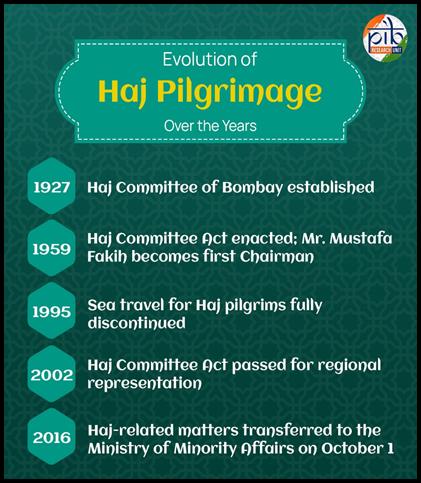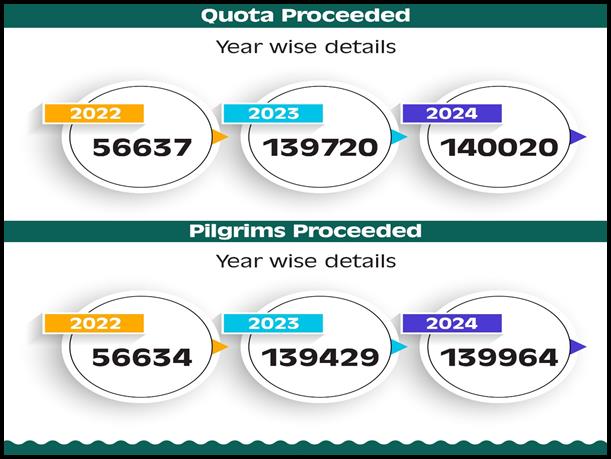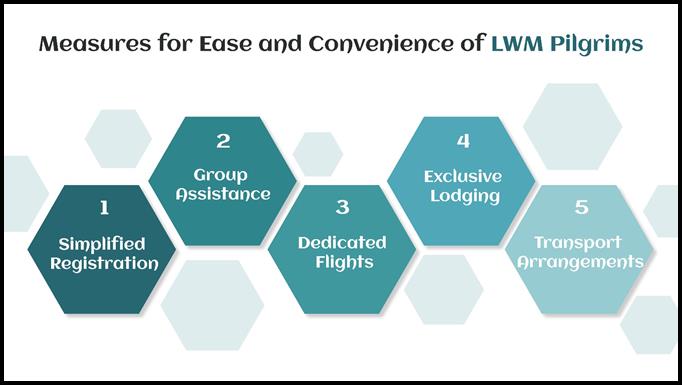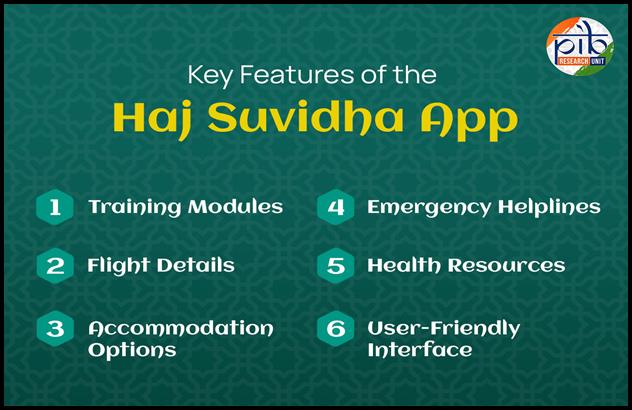Ministry of Minority Affairs
Enhancing Inclusivity and Equality in the Haj Pilgrimage
प्रविष्टि तिथि:
09 NOV 2024 11:33AM by PIB Delhi
Introduction
Haj, one of the Five Pillars of Islam, is a sacred pilgrimage to Mecca in Saudi Arabia that Muslims aspire to undertake at least once in their lifetime. Every year, millions gather in Mecca, driven by devotion and a shared sense of spirituality. The Government of India, recognizing the significance of Haj, has made provisions to facilitate the pilgrimage, particularly for low-income individuals. Pilgrim support cum facilitation programs have been introduced to enhance accessibility, especially for women facing unique challenges. Ongoing reforms and policy improvements have further enriched the Haj experience, promoting inclusivity and ensuring that diverse segments of the Muslim community can partake in this profound spiritual journey.
Background
The City of Bombay has a long-standing association with Haj, with Muslims embarking on their holy journey via the sea route from this port since British rule. The Haj Committee of Bombay was established in 1927, with Mr. D. Healy, Esq., the then Commissioner of Police, serving as its president alongside prominent Muslim public representatives. The first formal meeting of the Committee took place on April 14, 1927. Mr. Mustafa Fakih became the first Chairman of the Haj Committee constituted under the Haj Committee Act of 1959.
Evolution of Travel Methods
Until 1994, about 5,000 pilgrims traveled by ship from Bombay, while approximately 20,000 travelled by air. However, in 1995, sea travel for Haj pilgrims was discontinued, with all pilgrims then traveling by air. Consequently, additional embarkation points were established, increasing year by year.
Diversification of Haj Management
The growing number of embarkation points highlighted the need for appropriate representation from across the country within the Haj Committee of India. This led to the passage of the Haj Committee Act 2002, which ensures representation from all regions , in the Haj Committee of India.
With the objective to ensure more focussed attention to the Haj pilgrims, the responsibility for all Haj-related matters was transferred from the Ministry of External Affairs (MEA) to the Ministry of Minority Affairs (MoMA) on October 1, 2016, reflecting the ongoing commitment of the Government to support Muslim pilgrims.
Functions of the Haj Committee of India (CHC)
The Haj Committee of India commonly known as Central Haj Committee (CHC) has been established by the Government under the Haj Committee Act 2002, for making all arrangements for the pilgrimage of Muslims for Haj, and for matters connected therewith.
The Committee works under the administrative superintendence of the Government and discharges the following main functions: -
- Annual Conference: Organizes an All-India Annual Conference to review previous Haj arrangements, plan improvements, and finalize the action plan for the upcoming Haj with key stakeholders.
- Public Announcements: Issues announcements inviting applications for Haj through newspapers, detailing deposit amounts, accommodation options, and deadlines.
- Application Distribution: Provides free Haj Application Forms and guidelines to State Haj Committees, which collect applications and remittances from intending pilgrims.
- Quota Allocation: Distributes the Haj quota among States and Union Territories based on Muslim population; excess applications are managed through a draw of lots (qurrah).
- Data Processing: Digitizes applications and transmits data to the Consulate General of India, Jeddah, for managing accommodations and flights.
- Passport & Visa: Coordinates with Saudi Arabian authorities for visa endorsement, with applications processed at the Saudi Embassy in New Delhi and Consulate in Mumbai.
- Data Compilation: Compiles and verifies data, ensuring it is error-free before sending it to various agencies for Haj arrangements.
- Funds Collection: Collects funds based on accommodation choice, utilizes them for rentals and dues, and disburses the balance to pilgrims in Saudi Riyals for daily expenses.
- Foreign Exchange Rate Fixing: Sets the Riyal exchange rate through tenders and finalizes it for the Haj season.
- Airfare Collection: Notifies airfare rates, with pilgrims remitting payments via core banking.
- Flight Scheduling: Allocates flights post-scheduling, notifying pilgrims of departure dates and advising on reporting requirements.
- Embarkation Support: Operates from 21 embarkation points, providing camp offices and assisting with booking, remittance verification, and travel documentation.
- Vaccination Arrangements: Ensures supply of Meningitis and Polio vaccines and certifies inoculations for all pilgrims.
- Distribution of Haj Guide: Provides a comprehensive guide on Haj rituals, logistics, and Saudi regulations in multiple languages.
- Training Programs: Conducts orientation camps with selected trainers who prepare pilgrims for the journey, including private tour operators' pilgrims.
- Accident Insurance: Implements a Group Accident Compensation Scheme with a one-time premium charged to pilgrims.
- Madina Accommodation: Arranges uniform accommodation in Madina, ensuring most pilgrims stay within 850 meters from key areas.
- Air Transportation: Manages air travel arrangements for pilgrims through Air India and Saudi Arabian Airlines after the cessation of ship voyages in 1995.
Initiatives for Hassle-Free Haj Travel
Over time, the government has implemented several reforms to make Haj travel hassle-free, significantly enhancing digital backbone infrastructure for better accessibility and convenience. These initiatives also promote women's equality, allowing more women to undertake the pilgrimage independently.
I. ABOLITION OF HAJ SUBSIDY
The Haj subsidy, which aimed to offset travel costs for pilgrims from India to Saudi Arabia, increased from Rs. 10.51 crore in 1994 to Rs. 836.56 crore in 2012-13. However, the subsidy was gradually reduced and completely abolished for Haj 2018. Since then, a record 4.54 lakh Indian pilgrims have performed Haj without subsidy. The estimated savings of approximately Rs. 400 crores from the subsidy have been redirected towards the educational empowerment of minority students, particularly girls, leading to increased enrollment and reduced dropout rates from the schools. 
II. REQUIREMENT OF MEHRAM (MALE COMPANION) FOR WOMEN TO PERFORM HAJ REMOVED.
For decades, Muslim women in India have advocated for their right to perform Haj without a Mehram (male companion). Many, including professionals like teachers and doctors, faced barriers due to this requirement. In 2017, the government finally lifted these restrictions, marking a significant milestone, towards women empowerment.
During Haj 2023, the Government of India allowed single eligible women to apply individually under the LWM (Lady Without Mehram) category, eliminating the previous requirement to form a group of four. This change led to unprecedented participation, with over 5,000 women applying under the LWM category—an increase of 20% from the previous year. These initiatives have significantly advanced gender inclusivity and women’s empowerment in the context of the pilgrimage. 
III. DIGITISATION OF HAJ PROCESS
In previous years, Haj management processes relied heavily on manual and offline methods, resulting in a cumbersome and opaque system involving multiple agencies. To address this challenge, the Haj Committee of India (HCoI) recognized the need for a more efficient approach and has successfully digitized many Haj-related services, enabling citizens to access them anytime and anywhere. This modernization includes improvements to the application process and the computerization of the draw for selecting Haj pilgrims.
- Applicants can now easily register for Haj through the official website at hajcommittee.gov.in.
- Additionally, the launch of the Haj Suvidha App on March 3, 2024, marks a significant step forward in enhancing the pilgrimage experience.

IV. ABOLITION OF DISCRETIONARY QUOTA
Since Haj 2023, the Government of India has removed all discretionary quotas previously held by dignitaries, including those from the Ministry of Minority Affairs, to promote equal opportunities for all citizens. These seats have been integrated into the general allocation for Haj pilgrims. Selection is now conducted through a digitized random process, ensuring transparency and immediate notification for both selected and waitlisted pilgrims.
V. SELECTION OF DEPUTATIONISTS
In 2023, the selection of administrative deputationists was exclusively made from CAPF personnel to enhance professionalism and support for pilgrims. Given the challenging topographical and climatic conditions in Saudi Arabia, CAPF members are well-trained and suited for such demanding work.
- MAJOR NEW INITIATIVES TAKEN FOR HAJ 2023:
- The Government has taken special cost cutting measures in Haj package by removing non-essential costs incurred on account of mandatory purchase of buckets, bed sheets, suitcase, etc.
- The mandatory provision of providing Saudi Riyals 2100 to every Haj pilgrim has been removed and pilgrims are being given flexibility to obtain Saudi Riyals as per their personal requirement.
- For the first time, Foreign Exchange and FOREX is being provided to the willing pilgrims directly through SBI at the most competitive rates. This will bring transparency in the process of obtaining FOREX by Haj Pilgrims.
- The insurance cost has been reduced to Rs 10.50 per pilgrim as against Rs 13 per pilgrim earlier.
- This year, there has been direct involvement of MoH&FW and its agencies for Medical Screening and vaccination of pilgrims in India and hospitals/dispensaries in KSA during Haj.
- Due care is provided for inclusiveness of divyangjans and old age pilgrims by including special provisions in Haj policy.
- As duties of Administrative Staff selected for Haj deputation involves core physical strength and working under extreme climatic conditions, the Selection of Administrative deputationists for Haj-2023 is made from CAPF Personnel only.
- The Selection of Doctors and Paramedics for Haj-2023 has been made by M/o H&FW to involve their field specific expertise and improve the selection of Medical contingent.
Major Initiatives for Haj Pilgrimage 2024
- Bilateral Agreement with Saudi Arabia:
In 2024, a Bilateral Haj Agreement was signed on January 7, 2024, with H.E. Dr. Tawfiq bin Fawzan Al-Rabiah, Minister of Hajj and Umrah, Kingdom of Saudi Arabia (KSA) at Jeddah. This agreement established a total quota of 1,75,025 pilgrims from India for Haj 2024, with 1,40,020 seats reserved for those traveling through the Haj Committee of India. This allocation is particularly beneficial for first-time pilgrims, while 35,005 seats are designated for Haj Group Operators.
- Medical Care Arrangements:
The Union Health Ministry oversaw comprehensive medical care for approximately 1,75,025 pilgrims, including around 40,000 elderly individuals aged 60 and above. In response to harsh weather conditions, round-the-clock medical support was provided, featuring enhanced services such as oral health and dental care, based on previous experiences. This year, nearly 2 lakh outpatient consultations were conducted, along with regular visits from medical teams to ensure the well-being of all pilgrims.
- Facilitation Centres for Haj Pilgrims:
The government has established robust facilitation centers within Indian Missions to prioritize the welfare and safety of pilgrims abroad. These centers respond promptly to issues raised by pilgrims through various channels, including phone calls, emails, and social media. Indian Missions actively monitor the well-being of Indian nationals and are prepared to provide immediate support during emergencies, offering consular assistance, food, shelter, and return passage when needed.
Conclusion
The Haj pilgrimage has significantly improved thanks to initiatives from the Haj Committee of India and the Ministry of Minority Affairs. The Haj Committee has streamlined processes, enhancing accessibility and organization for thousands of pilgrims through improved logistics and dedicated support services. Complementing these efforts, the Ministry has introduced policies that provide financial assistance and awareness programs, empowering pilgrims and making their journey smoother. These initiatives not only honor the spiritual significance of Haj but also foster a sense of community among Indian Muslims. As these organizations continue to collaborate, the pilgrimage is poised to become even more meaningful and accessible, reflecting a strong commitment to the welfare of pilgrims and promoting cultural and religious diversity in India.
References
Click here to download PDF
****
Santosh Kumar/ Ritu Kataria/ Kamna Lakaria
(रिलीज़ आईडी: 2071944)
आगंतुक पटल : 6370